
Five things to know about hernia
Whether you're decorating or de-cluttering as you get ready for the holidays; moving in a way you generally don't could lead to a painful an unexpected problem – a hernia.
Hernia is a condition that can escalate seriously, sending patients to the operating room, according to surgeon Derek Brenda, MD.
“A hernia is a weakening on a layer of muscle that causes a hole, which presents with pain or bulge or both,” Dr. Brenda said.
Often, a hernia will limit activity because of pain.
“Patients will say they were lifting something and noticed a bulge or pain, or they felt a bulge they never noticed before,” Dr. Brenda said.
If left untreated, a hernia will grow with time because patients continue at their current activity level and “work through the pain.” But it can get worse if it goes untreated.
“When we're doing heavy lifting, our abs and core tighten down to give us strength. If a hole is there, things push through the weakening or hole and the hole gets bigger,” Dr. Brenda said. “In turn, the bulge gets bigger.”
Surgery to correct hernia lasts two hours or less and can be done laparoscopically. Neglecting to have a hernia repaired can lead to serious complications, such as a bowel obstruction or dead bowel.
Five things to know about hernias
- Groin hernias occur in approximately 2 percent of the adult population and 4 percent of infants. It is also very common in post-operative patients.
- Know the symptoms of a hernia. Dr. Brenda says patients will have either a bulge or pain. An inguinal hernia is most common – these occur where the skin crease at the top of the thigh joins the torso and appear as a bulge.
- Men are 25 times more likely to develop an inguinal hernia than are women.
- Hernia belts and limited lifting and activity can help alleviate some pain, but will not fix a hernia.
- Robotic surgery for a hernia is possible – small incisions means less pain, Dr. Brenda said. Laparoscopic surgical repair for hernia also means less pain and earlier return to work and activity for patients.
“Fix it, move on with life,” Dr. Brenda recommends. “Get it looked at – make an informed decision with your primary care physician or surgeon.”












